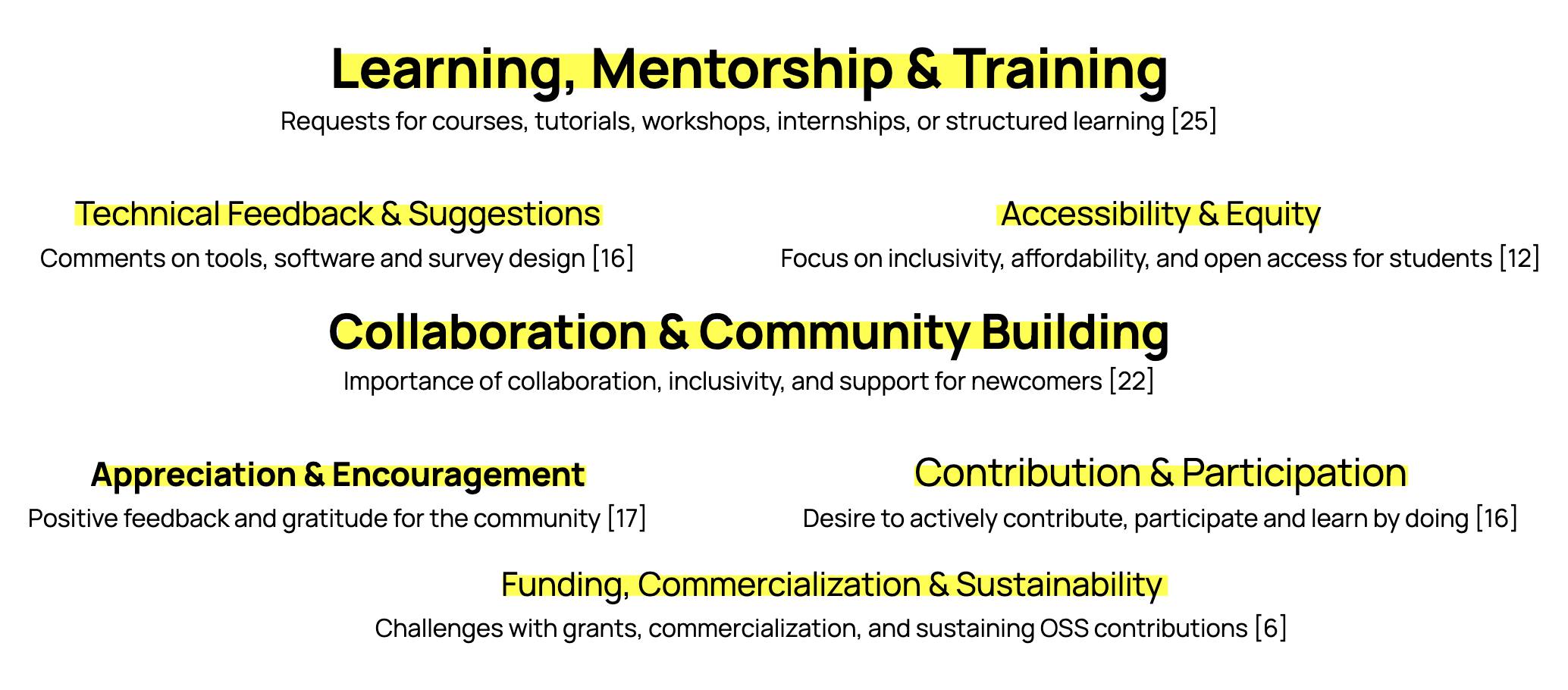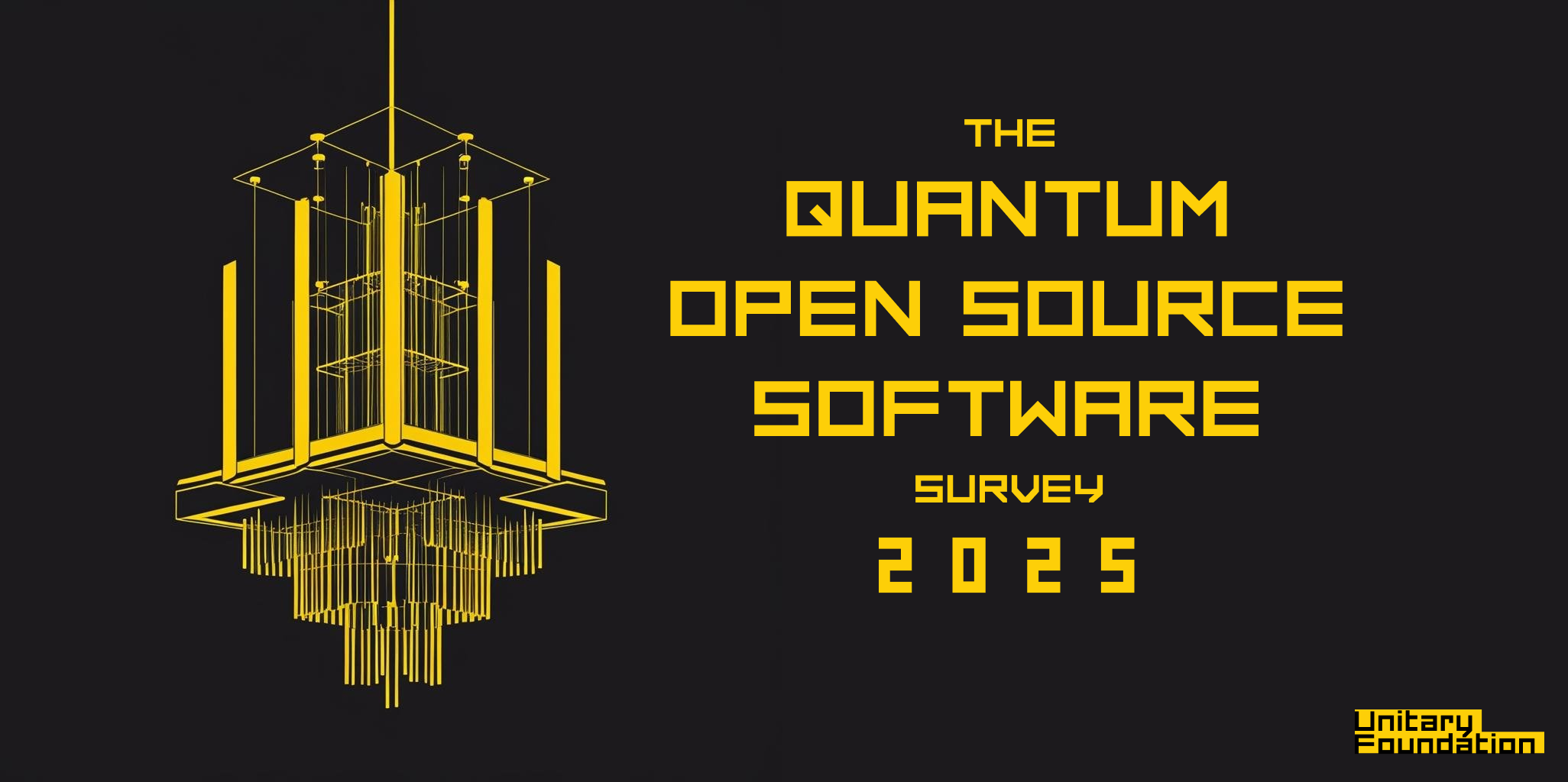2025 Quantum Open Source Software Survey Results
Dear community members,
Unitary Foundation is happy to share the results of this year’s Quantum Open Source Survey! Now in its fourth iteration, the survey is meant to serve as a snapshot of our community to provide illuminating and actionable insights as we look to develop a quantum ecosystem that is the most useful to the most people.
Topics covered include Demographics, Experience, Cloud Services, Full-Stack Development Platforms, Compilers and Simulators, Software for Applications and Tools, User Experience, OSS Development and Research, and Community.
Thank you to you all for your input, answers, and participation! We continue to be amazed at the tools being developed all the time that push the science forward in ways both big and small. A special thank you as well to our supporting and core members, for their guidance, thought leadership, and ongoing support of Unitary Foundation and the open source ecosystem.
Read the full survey results here. We’ve provided some insights below and look forward to hearing what you think as well! Write to us at info(at)unitary(dot)foundation with any questions or comments.
Warmly,
The UF Team
📊 Demographics
This year’s survey revealed several fascinating shifts within the quantum community. In terms of Roles, the profile of the respondents remained largely consistent, with one key exception: the number of self-identified hobbyists has now surpassed educators, a key role for any open source ecosystem, and one we continue to strive to cultivate.
For Background, we observed an increase in classical software professionals entering the field, while the percentage of dedicated researchers saw a slight decrease.
The community is overwhelmingly young. The largest age group is 21-25 (32.8%), and over half of all respondents (53.6%) are aged 30 or younger. This indicates a strong pipeline of early-career professionals and students entering the field, suggesting sustained growth and high energy for new development and research.
The data on Affiliation and Pay shows mixed signals regarding the rise of the DIY quantum developer. The “No affiliation” response jumped significantly, from 7% to 11%, potentially indicating more individuals are working on open source quantum projects independently. Yet, more respondents (up from 53% to 56%) now report that this is their full-time job, not just a side project. An especially fascinating point is that nearly 40% of people working in the field do so without pay.
Finally, the Educational Background of respondents appears more evenly dispersed this year, with the percentage split between those holding Masters degrees and PhDs becoming closer compared to last year, which saw a higher percentage of PhDs.
⚙️ Full-stack development platforms, compilers, and simulators
We noted significant interest in up-and-coming and smaller packages. Here are the ones that jumped the most this year:
-
OpenQ: Grew from 1.1% to 7.7% in current/future usage.
-
Yao.jl: jumped from 1.3% to 7.9% in current/future usage.
-
UCC (Unitary Compiler Collection): Had the highest jump from 2% to 10% in current/future usage.
🛠️ Software for Applications and Tools
This year saw the addition of a dedicated section to Quantum Error Correction (QEC) Software. It’s encouraging to see such an even split between people already using QEC software and those interested in trying it, and we encourage you to take a further look at the data to find out more
🔬 Open Source Software (OSS) Development & Research
When respondents were asked about the type of quantum computing research they perform, compilation (infrastructure) emerged as the third most popular area. The top three areas are Algorithms, Applications, and Compilation. This confirms a community-wide recognition that building efficient tools and the quantum software stack is just as critical as developing new algorithms or applications.
Regarding the areas of quantum computing believed to be the most promising for future research, there were a few significant drops from 2024 to 2025:
-
Hardware Development: While 34% of respondents believed it was the most promising in 2024, only 27% believe this to be true in 2025.
-
Error Mitigation: While 28% of respondents believed it was the most promising in 2024, only 23% believe this to be true in 2025.
-
Algorithm development, Error Correction, and Application development continue to be considered the most promising!
It’s encouraging to see high interest in respondents wanting to co-author a research paper based on work with open-source software. Unitary Foundation will look to encourage new engagement around this topic in the coming year.
Finally, the data on Programming languages the respondents would like to learn was unambiguous: Everyone wants to learn Rust!
💬 Community
We are thrilled that nearly 95% of respondents reported a positive experience with the quantum OSE! As always Unitary Foundation will strive to increase this number and ensure the ecosystem is providing the right resources to its community.
This year, there continued to be a relatively even spread of resources the community looks to use to learn or contribute to the OSE, however, video resources surpassed hackathons as the number one method for engagement assistance.
When asked about the Source of answers or information when developing quantum software, we are encouraged that project documentation and source code remain higher-ranked than chatbots. This confirms that having good docs and readable code still matters most to developers.
In the open-ended feedback section, the top two categories of responses were: Learning, Mentorship & Training (e.g., requests for structured learning, workshops, tutorials) and Collaboration & Community Building (e.g., importance of inclusivity and support for newcomers). This suggests that the community is actively calling for more formalized educational pathways and stronger structural support to welcome and onboard new members.







